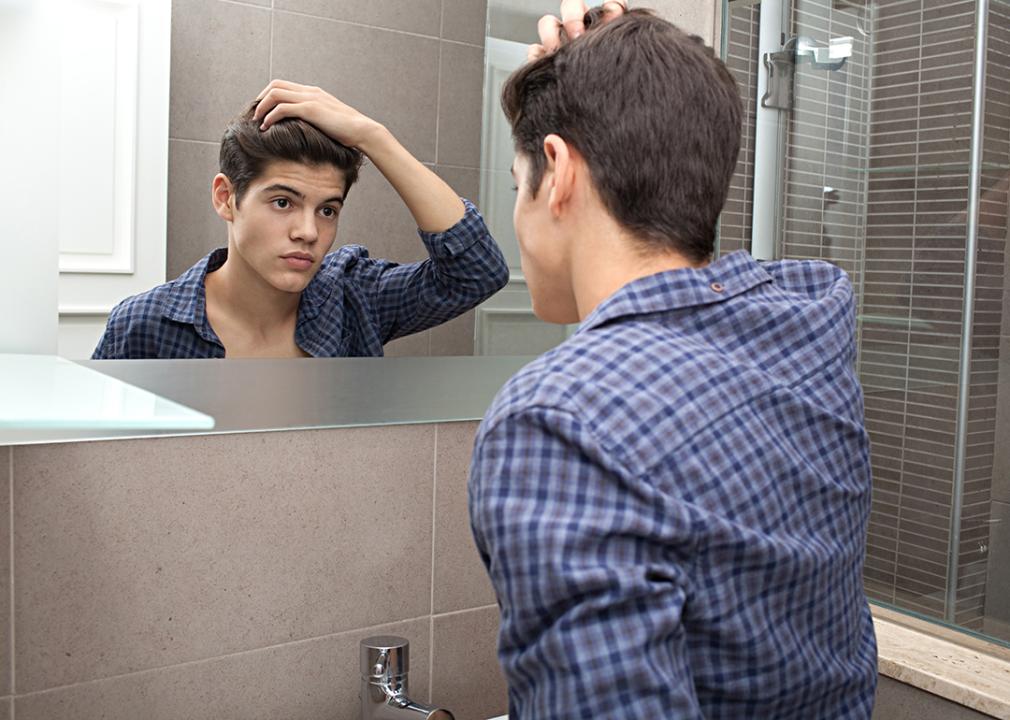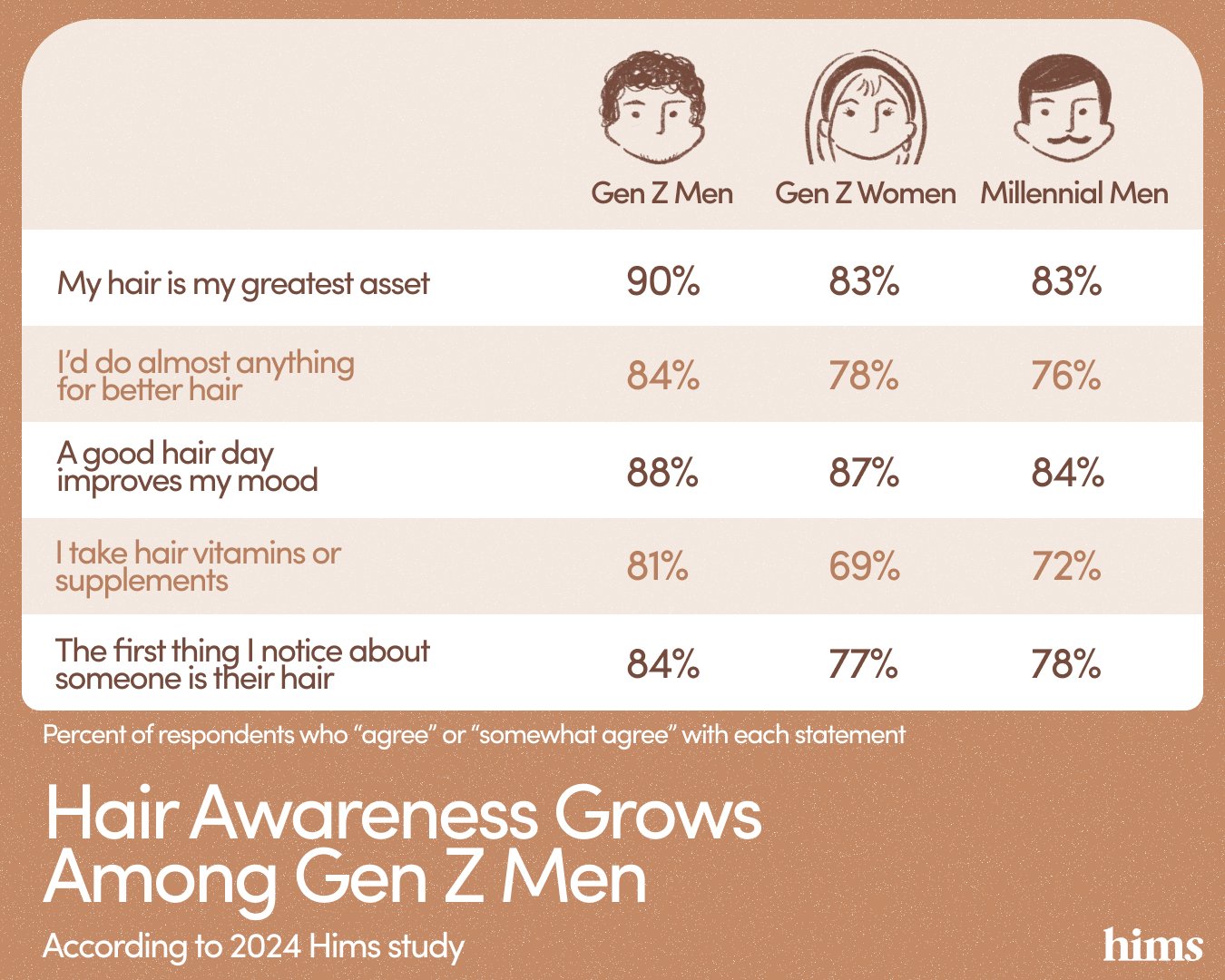Melissa Lavigne-Delville

MJTH // Shutterstock
There are countless stories of young girls passionate about skincare and stocking up on anti-aging serums, yet Gen Z men may be the most underrepresented demographic in the beauty industry, especially when it comes to hair care.
84% of Generation Z men surveyed say they would almost anything to have better hair, compared to 78% of Gen Z women surveyed who feel the same way, according to a 2024 study by Hims. Gen Z men also love their locks more than their older counterparts: 90% say their hair is one of their greatest assets, compared to 83% of Millennial men and 63% of Gen X men.
Hair awareness across generations
![]()
Men of Generation Z are body conscious

Hims
Aside from hairstyles, Gen Z men are also more body conscious than their female counterparts. On average, Gen Z men spend twice as much on weight loss annually as Gen Z women ($714 vs. $360) and they are 1.5 times more likely to follow a vegetarian or vegan diet than Gen Z women (15% vs. 10%). Additionally, 30% of Gen Z men say their weight has an “extreme impact” on their self-esteem, versus 25% of Gen Z women.
However, just because Gen Z men care about their bodies doesn’t mean they’re insecure about their appearance. Nearly eight in 10 Gen Z men, or 79%, consider themselves “attractive” (a 4 or 5 on a 5-point scale), compared to 67% of Gen Z women who feel the same.
7 Reasons Why Hair Matters to Generation Z Men
Generation Z men are twice as stressed about their hair as they are about the upcoming presidential election.
When asked what stresses them out the most, Gen Z men surveyed were twice as likely to say “my hair” (15%) than “the upcoming presidential election” (7.5%). They are also more stressed about their hair than their ex (12%), climate change (12%), and even “the unknown” (12%).
They spend more on hair care than Millennial men or Generation Z women.
Gen Z men spend an average of $593 annually on hair care, 34% more than Gen Z women, who said they spend $425 annually. What do they spend their money on? About 39% take vitamins or supplements to improve their hair (vs. 30% of all respondents); and 38% have tried a hair growth product (vs. 31% of all respondents).
Gen Z men say having a great hair day is better than going viral.
When asked to describe their ideal day, young men were 50% more likely to say that “having a great haircut” brightened their mornings than “going viral” (14% vs. 9%). It was also rated as a better way to start the day than an inspiring idea (13.5%), losing a few pounds (13%), an unexpected day off (10%) or good news in their newsfeeds (9%).
They spend (much) more time caring for their hair than women.
Gen Z men spend 35% more time on their hair each day than women overall. On average, Gen Z men spend 44.26 minutes on their hair, compared to 32.68 minutes for women. A third of men say they spend 30 minutes to an hour on their hair each day, and an impressive 15% spend more than an hour each day caring for and styling their locks.
Generation Z men prefer beautiful hair to good food more than women.
A remarkable 38% of Gen Z men say they would rather have good hair than good food, compared to 31% of Gen Z women and 28% of all respondents who feel the same. While it’s true that Gen Z men overall still prefer good food to good hair (62%), they were the demographic most likely to care more about their appearance than their food. Only 30% of Millennial men and 21% of Gen X men value good hair over good food.
Hair has a big influence on the first impression.
More than any other generation or gender, Gen Z men say their first impression of others is shaped by their hair. 84% agree with the statement, “The first thing I notice about other people is their hair.” In comparison, 74% of Americans overall feel this way. They are attracted to others with medium-length hair (37%) over long (35%) or short (29%) hair. They also prefer a clean-shaven face (57%) over a full beard (43%).
“Good hair days” can even improve the work performance of Generation Z men.
Good hair lifts young men’s moods. A full 65% of Gen Z men say their hair is “extremely impactful” or “influential” on their day overall, compared to 54% of Americans overall. In addition, 93% of Gen Z men, compared to 85% of respondents overall, say good hair positively impacts their lives in at least one way — 21% say it improves their mental health; 18% say it inspires them to exercise more; and 16% say it improves their work performance.
Data and methodology
This study is based on an online survey of 5,504 people, including 5,000 18-65 year olds from the 50 largest metropolitan areas (100 respondents per city) and a nationally representative sample of 504 18-65 year olds to contextualize the results. The study was conducted in May 2024.
The results were analyzed using more than 100 demographic and psychographic criteria, including city, region, gender (when we say “women” and “men,” we mean all people who self-identify as such), age, race and ethnicity, relationship status, parenting status, sexual orientation (straight, bisexual, gay, lesbian, pansexual, asexual, queer, etc.), and political affiliation.
All data in this study comes from this source unless otherwise stated. The independent research company Culture Co-op conducted and analyzed the research and results.
3 tips for healthier hair
- Eat a balanced diet. Adopt a hair-friendly lifestyle. Your diet plays a crucial role in the health of your hair. Eating foods rich in essential vitamins and minerals, such as omega-3 fatty acids in fish, vitamins A and E from leafy greens and nuts, and biotin from eggs and avocados, can improve hair strength and even promote growth. A healthy, balanced diet can even help prevent hair loss.
- Integrate regular scalp massages into your routine. Some research suggests that a scalp massage can stimulate hair growth. Scalp massages increase blood flow to hair follicles, which can promote regrowth and increase hair density. Gently massage your scalp with your fingers or a scalp massager for about five minutes daily.
- Choose a pillowcase made of silk or satin. Unlike cotton, silk and satin create less friction, which can reduce hair breakage and frizz while you sleep. This simple change can help improve the overall condition of your hair by minimizing wear and tear during the night.
This story was produced by Hims and reviewed and distributed by Stacker Media.
